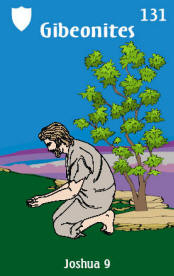|
Search CBD
The Gibeonites Trick Joshua
Vocabulary:
- deceive: to say or do something that causes someone to believe a lie, or to hide the truth.
- oath: to make a serious promise, to swear to something
Joshua 9"To protect their countries, some of the kings of Canaan decided to bring all their armies together to fight the Israelites. After seeing God’s power, they were afraid to fight alone. But the people in nearby Gibeon would not join them. Perhaps they knew God of Israel would help his people win even if all of the kings in the world came together. The Gibeonites thought it would be better to make a treaty (or agreement) with the Israelites..." Read the full lesson text.Object Lesson: Bring a box of candy or mints, etc into class, filled with paper clips instead. Tell the students that just for coming today, they get a treat. Give them each a clip from the box. Act excited, like they received candy. When they show disappointment, describe how great a paper clip is and all the wonderful things they can do with one. When they deny that a paper clip is a treat, discuss deception. Many people today rename activities, or products, to sound better than they are. They call sinful behavior an alternative lifestyle. They call murder a "choice". They are trying to make a sinful thing look better than it is. As children of God, we must carefully examine what others are trying to convince us of, just like in this lesson.
Activity: bring a work shirt and a dress jacket into class. Have two students each don one. Then have them switch. Ask the class what the difference was between the two - just the outer shirt. Talk about how the student inside the shirt didn't change because they put on other clothes. Can wearing nice clothes and going to a certain building on Sunday's make us good? Only changing what's inside, our heart, makes us good. You can dress like a Christian, and act like a Christian, but God said that our fruit, or actions, show what's inside. Our life and behavior show whether we really are good. The lies of the Gibeonites showed their character. Joshua's refusal to break his oath showed his.
Discussion: Do two wrongs make a right? What two wrongs happened in this lesson? 1) The Gibeonites lied to the Israelites, 2) Israel made a treaty with the Gibeonites. God counted the treaty as wrong, despite the ignorance of the Israelites. He did not believe ignorance was an excuse then, and He doesn't now. Sin done in ignorance is still sin, and must be repented of. Did the Gibeonites' lie make the oath void? No. Many people today would say that they wouldn't have to keep a promise if it was based on a deception. But God held Israel to their oath. They knew that breaking their oath would simply be another sin. Instead, they repented of their oath-taking, while dealing with the consequences. Our sins have consequences sometimes - and we must deal with them, not sin more trying to negate them. There are some promises and commitments we make "for better or for worse". When a woman brings a life into this world as a consequence of a sinful act, the proper response is repentance, and care for the child. Not abortion. Sin will never right a wrong. Only humble obedience will.
Memory Work:
1 Samuel 16:7b "...for the LORD sees not as man sees; for man lookes on the outward appearance, but the LORD looks on the heart."Joshua 10:13 “So the sun stood still and the moon stopped till the people had revenge on their enemies.”Sing: Oh the BIBLE
True or False
- The Gibeonites were afraid of being destroyed. T (Joshua 9:24)
- Joshua and the leaders of Israel depended on the appearance of the Gibeonites to confirm their story. T (Joshua 9:14)
- Joshua felt his oath of peace was no longer valid since the Gibeonites lied to him. F (Joshua 9:19)
- The Gibeonites were left alone by the Israelites. F (they were made servants) (Joshua 9:27)
- God should have been consulted before making the treaty. T (Joshua 9:14)
 |
linguistic questions |
|
|
 |
activity questions |
|
|
 |
emotion questions |
|
|
 |
application questions |
|
|
 |
fact questions |
|
|
 |
review questions |
|

